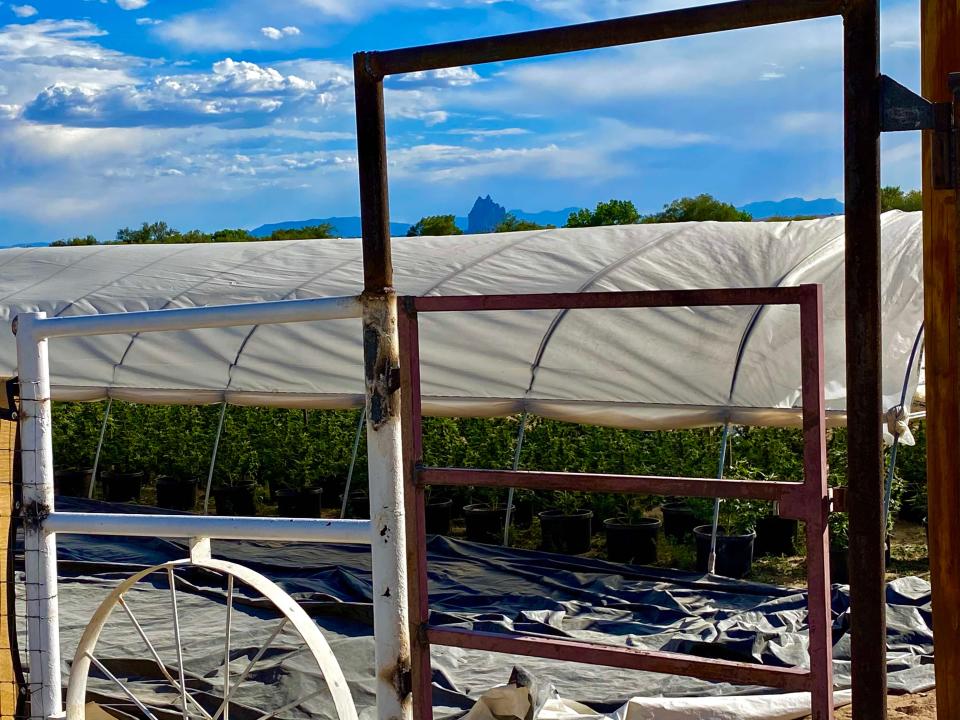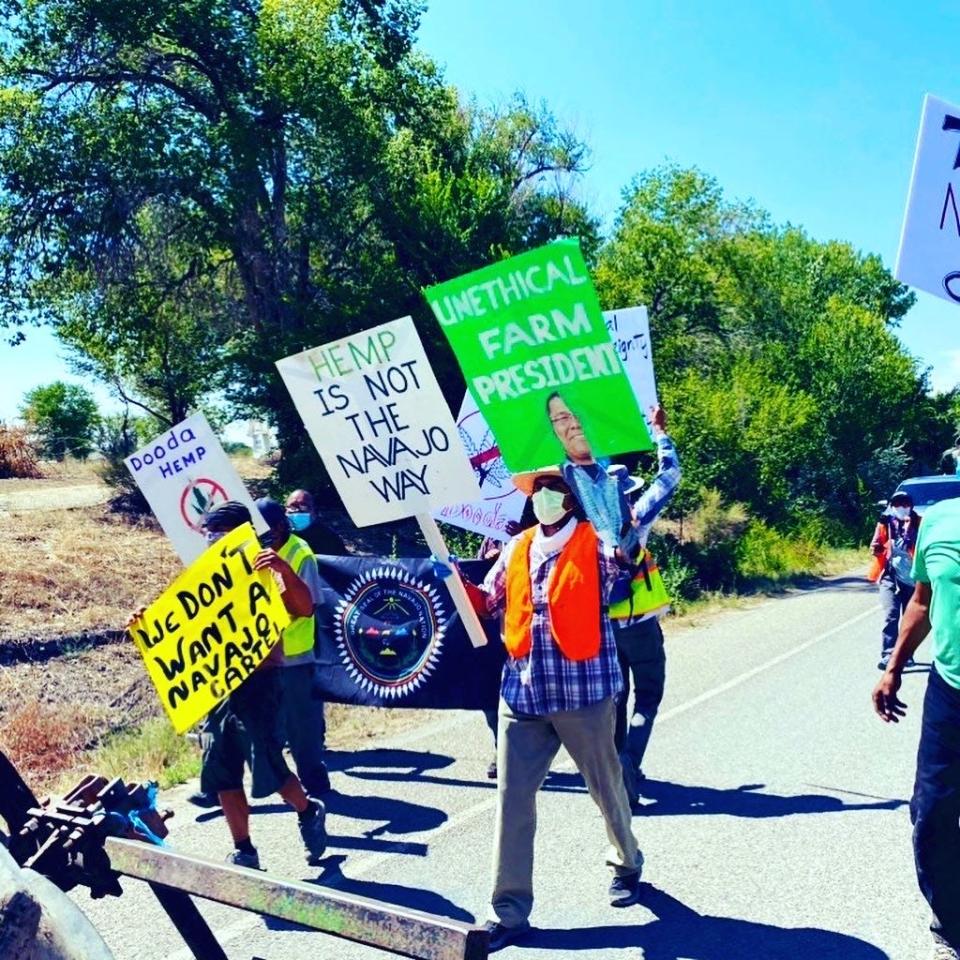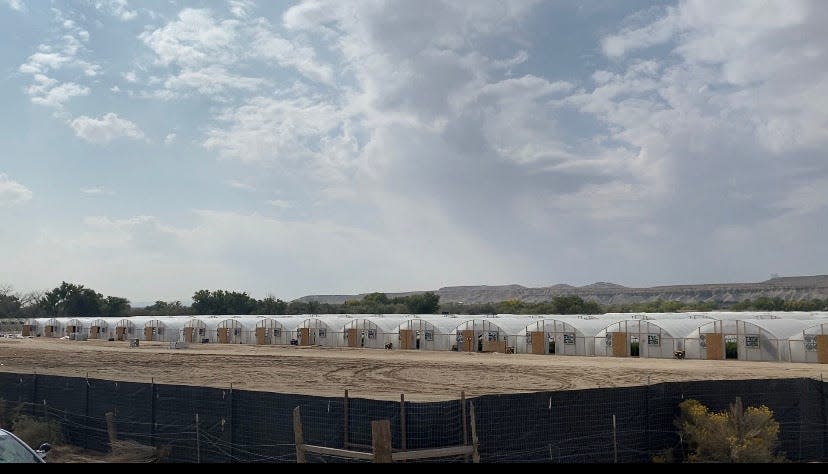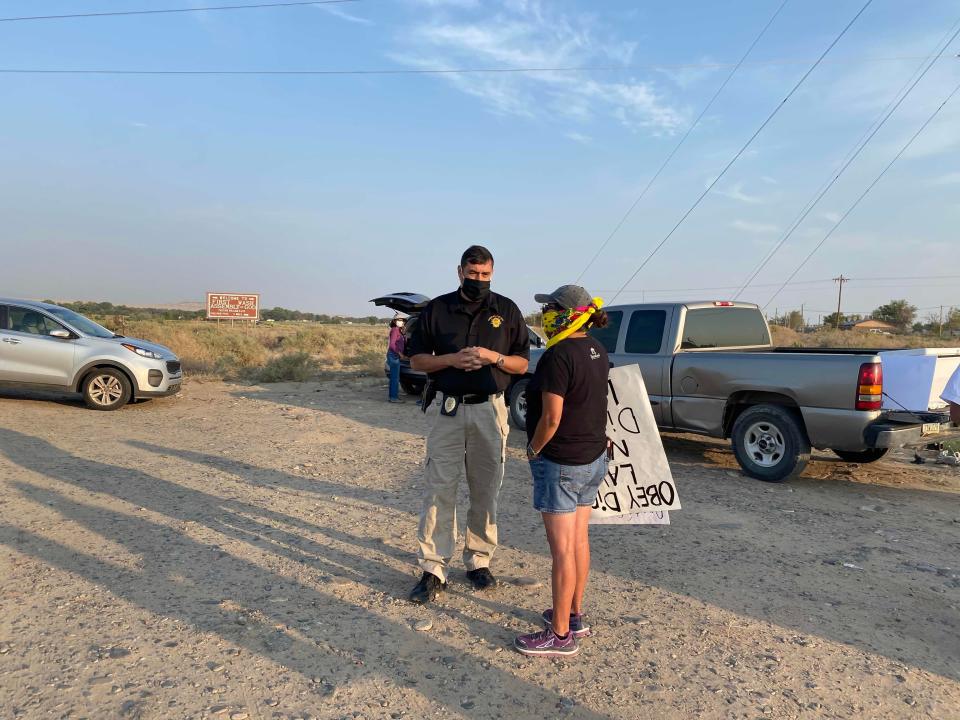Former workers sue operators of illegal hemp and pot operations, claiming forced labor

Fifteen former workers of a shuttered hemp farm near Shiprock, N.M., filed a lawsuit in New Mexico District Court in Santa Fe alleging claims of forced labor and human trafficking in connection with illegal cannabis operations at the facility, run by a one-time presidential candidate in several Navajo Nation communities, according to a news release.
During the summer of 2020, amid heightened concern over the pandemic, former Navajo Nation Presidential candidate Dineh Benally built and operated large hemp and cannabis farms near the Navajo Nation community of Shiprock, enterprises that were found to be illegal.
The Arizona Republic was unable to reach Benally for comment.
The named workers on the complaint claim to have been hired under false pretenses and are suing Benally and other defendants. Workers have claimed they were forced to work 14 hours per day trimming cannabis at the Travel Inn motel in Farmington, were not allowed to leave and were never paid for their work.
Other defendants in the case include individuals and entities involved in the cannabis cultivation operation, including Irving Lin, a Taiwanese entrepreneur arrested in February 2022 during the raid of an illegal marijuana operation in California; the Nasdaq-listed company SPI Energy Co. Ltd. and its principal, Xiaofeng (Denton) Peng, previously the richest man in Jiangxi Province but now a wanted criminal by Chinese authorities; and the owners of the Travel Inn motel.

The complaint alleges that these individuals and entities, along with others, conspired to carry out an illegal cannabis operation that involved subjecting the plaintiffs and other workers to forced labor, according to the release from Aaron Halegua, an attorney for the workers.
“Ending forced labor requires that the perpetrators of forced labor and those who seek to benefit from such schemes face serious consequences,” said Halegua. “We hope that this lawsuit will demonstrate that such abusive practices do not pay.”
Police found evidence of mistreatment
Former Navajo Nation Police Chief Phillip Francisco, now police chief at the Bloomfield (N.M.) Police Department, collaborated with his officers to intervene and halt the expansion of these farms. Because of the limited legal authority provided by Navajo Nation laws and the slow response from tribal leadership, the cultivation activities persisted for several months.
Francisco and his officers were faced with the challenging task of addressing not only the illegal cannabis cultivation on tribal lands but also mediating tensions among divided community members who held differing opinions on the cultivation issue. There was also concern about the treatment of outside workers, many of whom were unaware that the work they had agreed to was illegal, said Francisco.
Community members rallied and protested against outside workers who came in droves to Shiprock. Among the workers were more than 1,000 exploited Navajo child laborers and Chinese migrant workers hired to grow and process the cannabis while they were patrolled by armed guards, according to the complaint.

“We had strong suspicions the workers were being taken advantage of, especially the foreign workers,” Francisco told The Republic. “There was a suspicion they were being unfairly treated, of inhumane living conditions on those farms. We didn't know what the agreements were. This isn’t a surprise this lawsuit was brought considering the illegal nature of the whole operation.”
The Navajo Nation attempted to shut down the farms by filing a lawsuit against the onslaught of the farms, but it did not deter operations at this point the farms had spread throughout the community.
The suit alleged that the defendants were unlawfully issuing land-use permits to foreign entities to grow and cultivate industrial hemp on the Navajo Nation. Tribal authorities filed a motion for a temporary restraining order and a request for a preliminary injunction to ensure that the defendants were prevented from continuing their unlawful operations.
Lawmakers eventually got enough heat from community members to amend the Title 17 criminal code’s definition of cannabis.
The operations disregarded Navajo Nation law, people and workers; the Navajo Environmental Protection Agency also reported many environmental violations.
The remnants of hoop houses where hemp and marijuana once grew are still visible from the road through Shiprock. It's unclear whether anyone addressed the environmental violations, including a large spill of petroleum, possible leaking of the red-dyed diesel found in huge water hauling containers, illegal water wells, and septic tanks jury-rigged to toilets with a discharge pipe going into the wash.
“I did see some of the farms that had living conditions that were plywood shacks,” Francisco said. “Makeshift heating and electricity lines and some of the electricity lines were illegally tapped into the power lines without regulations. Water was being siphoned from other places, there was no sanitation, there were reportedly many people in one quarter.”

Workers were recruited from California to 'cut flowers'
Months into the marijuana and hemp operations, Navajo courts ordered the farms shut down, but according to the complaint, the defendants continued to process and sell cannabis to recoup their investment. As part of this effort, the cannabis was transported from the farms on the Navajo Nation to other sites to be processed, including the Travel Inn motel in nearby Farmington, according to the release.
The defendants recruited workers in California and other areas by advertising jobs “cutting flowers” that paid $200 per day. Workers drove or paid for rides to Farmington, where their car keys and phones were taken upon arrival, and workers were forced to work long hours in unventilated rooms. The workers' requests to quit and go home were refused, and they were kicked and cursed at to work faster, the complaint said.
"The abuse of plaintiffs only ended when the Farmington police raided the hotel in October 2020 and then handcuffed and arrested everyone present," according to the complaint. "The plaintiffs spent nearly five days in jail, where several of them contracted COVID-19, and the criminal charges were only dropped two months later."
Francisco’s officers, along with state and federal partners, raided the Shiprock farms, finally ending the operations.
“It was bleeding over not just on Navajo but to other counties and surrounding areas,” said Francisco. “So we worked with our FBI partners, and we started having discussions on how to bring everyone to the table as a team effort to address this. Our laws on the Navajo Nation didn’t have enough teeth to criminally prosecute it because there were loopholes. It was a complex process that led us to that (raid).”
The complaint alleges that workers lived in cheaply built trailers or mobile homes installed on the Navajo Nation, while others lived in the Travel Inn in Farmington and were taken to the cannabis fields.
“Local authorities reported that due to the influx of people as part of defendants’ operations, there was zero available housing inventory in the areas surrounding the reservation,” said the complaint. “The number of workers was so great that it took hours for the lined-up vehicles to exit the reservations to transport the workers back to the residences at the end of the shift.
Three years later, nothing has come from the raids, except for 33 Navajo farmers being sued at the time because they were growing marijuana for the operation.

'It has the potential to happen again'
Last year, Benally ran for Navajo Nation president, to Francisco’s surprise. Benally was charged with aggravated assault after he allegedly turned and drove his Cadillac Escalade SUV toward people protesting his operations, stopping just two to three feet in front of the protesters, according to the complaint.
“I was surprised,” said Francisco about Benally running for president, “considering all the controversy.”
At the time, New Mexico had legalized marijuana sales, but the legalization did not extend to the Navajo Nation. Even if it were permitted on Navajo, the business regulation was grossly mismanaged, Francisco said, and the workers were mistreated.
"Just like any other business you have to follow business regulations, and none of that was followed," said Francisco. "It was all illegal, obvious human trafficking, money coming in, investors, violations of codes, stealing of equipment, power and water it doesn't make anything OK even if it were federally legal. None of this was taxed, there was a total invasion of tax. They didn't even pay the workers, there wasn't any record of that. It was all under the table."
Navajo Nation Attorney General Ethel Branch, who ran against Benally for president, emailed a statement to The Republic and said she has reviewed the complaint and found the allegations "horrendous and shocking, but not surprising based on the Navajo Nation’s experience addressing these operations."
"At one of our darkest hours, when Navajo law enforcement was focused day and night on responding to the COVID-19 pandemic, and our Navajo People faced the highest COVID-19 infection rates in the country, Benally and his associates took advantage of the Nation, and tried to personally enrich themselves," said Branch, who was not the attorney general at the time of this operation. "As the complaint alleges, they also misled and took advantage of hard-working individuals trying to make a living for their families during the uncertain times of the global pandemic.”
She said the federal government needs to take action and hold those responsible to account.
"Yet, to date, nobody responsible for the harm caused to the Navajo Nation and to these workers by Benally and his associates’ illegal marijuana operation has been prosecuted. This must change," she said. "The Navajo Nation and the Shiprock, New Mexico, community deserve justice. Those responsible need to face their day in court.
During the court-authorized operation, agents eradicated approximately 260,000 live plants and processed an estimated 60,000 pounds (30 tons) of evidence. Agents also found 19 trash bags filled with fully processed marijuana — 1,000 pounds — in baggies, ready for distribution. It was considered the largest such operation in New Mexico.
Critics say Navajo leaders have made few inroads on policy to prevent such illegal practices from happening again or to clean up what happened three years ago.
"It was such a big deal at one point in time and has now taken the back burner," said Francisco on Navajo Nation. "We dealt with the immediate up front, in your face issue, and now they (leadership) aren't willing to go any further to address the regulation, laws and rules that led up to this. Basically, someone came in and exploited all the loopholes of Navajo Nation code, and that has not been rectified. It has potential to happen again."
Arlyssa Becenti covers Indigenous affairs for The Arizona Republic and azcentral.com. Send ideas and tips to arlyssa.becenti@arizonarepublic.com.
Support local journalism. Subscribe to azcentral.com today.
This article originally appeared on Arizona Republic: Former Navajo Nation pot farm workers allege human trafficking in suit

